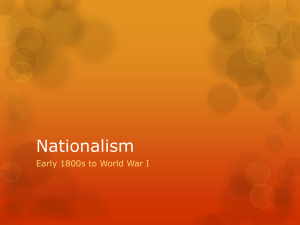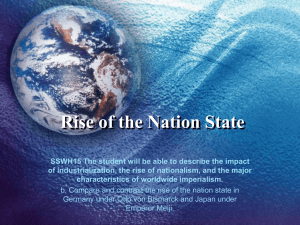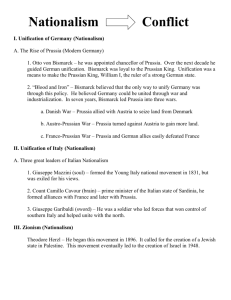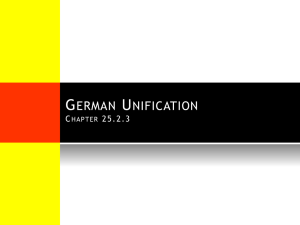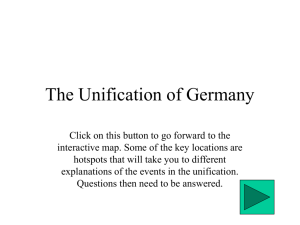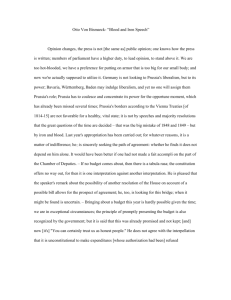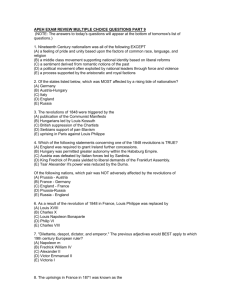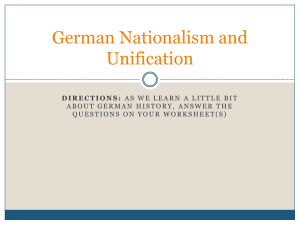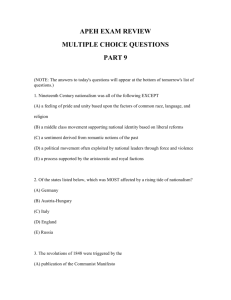Germany and Japan Nation
advertisement
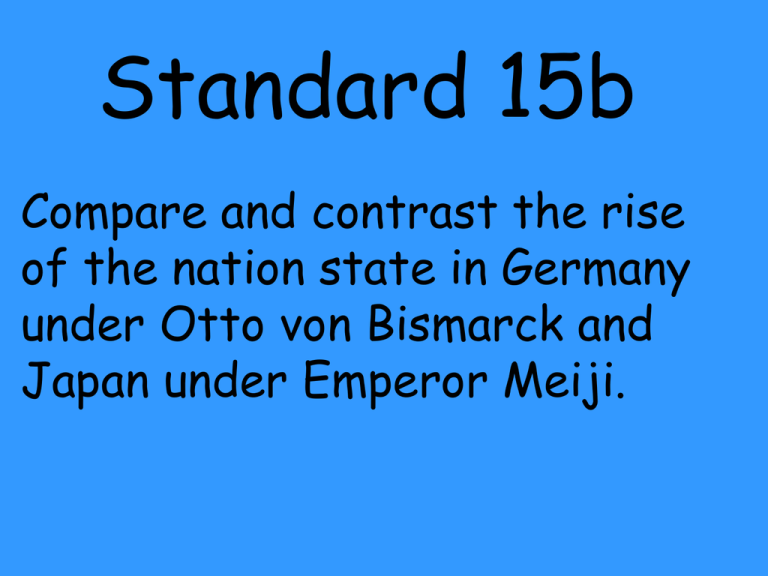
Standard 15b Compare and contrast the rise of the nation state in Germany under Otto von Bismarck and Japan under Emperor Meiji. NATIONALISM RISE OF NATION-STATES • GERMAN STATES • GERMANY • OTTO VON BISMARCK • JAPAN • EMPIRE OF JAPAN • EMPEROR MEIJII Nationalism • Nationalism is the most powerful idea of the 19th century (1800’s) – The belief that people should be loyal mainly to their nation – that is, to the people with whom they share a culture and history – rather than a king or empire • This idea led to the building of Nationstates Three types of Nationalism • Unification – Mergers of politically divided but culturally similar lands • Separation – Culturally distinct group resists being added to a state or tries to break away • State-building – Culturally distinct groups form into a new state by accepting a single culture Nationalism Unification of Germany: • Led by Prussia • Otto von Bismarck – Prime Minister under Wilhelm I – Policy of Realpolitik: • Tough power politics - no idealism • Issues not decided by resolutions, but by “blood and iron” • Allowed him to expand Prussia & achieve dominance Prussian Empire • Bismark uses his position to centralize power – Take regions from Denmark – Use the military victories to provoke Austria into attacking them – Use their advanced military training to defeat Austria Germany • 1815: German nation-states unify to form the German Confederation – Austria and Prussia both tried to dominate this group • 1848, Germans force a constitutional convention – Prussia is the best represented here because they are the most similar to Germany with a large ethnic German population Germany Seven Weeks’ War (1866) • Bismarck provoked Austria to declare war on Prussia • Prussia (superior training & equipment) humiliated Austria • Austrians lost Venetia – given to Italy • Had to accept Prussian annexation of more German territory • Prussia took control of N. Germany – for 1st time, E & W Prussia joined Germany Franco-Prussian War (1870-1871) • Bismarck manufactured “incident” that caused France to declare war on Prussia • Defeated and humiliated the French • Bismarck became a national hero w/ victory • Final stage in German unification • S. Germans (Catholic) accepted Prussian (Protestant) leadership • King Wilhelm I crowned “Kaiser” – emperor – Called empire “Second Reich” (HRE was the 1st) • Bismarck achieved Prussian dominance by “blood and iron” Industrialization in Japan Contributing Factors • Meiji Reform: – Meiji = “enlightened rule” – Mutsuhito – symbolized pride & nationalism – Took over gov’t after Tokugawa shogun stepped down Meiji Japan • The Meiji Era rulers decide that to compete and counter western influence was to modernize • Begin purchasing modern weapons, building railroads • Dress in western clothing • Japan began to trade with the rest of the world and became richer Industrialization in Japan Process: • Westernization: – To counter western influence = modernize – Diplomats sent to Europe, N. America to study Western ways – Chose best & adapted – Modernized military Industrialization in Japan Process: • Modernization: – Coal production grew – Built thousands of factories – Expanded unique production (tea & silk) – Shipbuilding to be competitive with west Japan Modernization Pays Off for Japan • By 1890, Japan had: – Several dozen warships – 500,000 well-trained, well-armed soldiers – Became strongest military power in Asia Japan Modernizes • Japan had not traded or interacted with others during the I.R. • 1853 Commodore Matthew Perry (US) goes to Japan and opens trade • Treaty of Kanagawa – Japan and the U.S. agree to trade and allow U.S. ships to refuel Japan Japan Gains Western Favor as a Nation-State • Constitution & legal codes similar to European nations • Wanted to eliminate extraterritorial rights of foreigners • 1894 – foreign powers accepted it • Strength & feeling of equality rose Japan Expands • Japan’s national pride led them to begin to expand • 1894 – Japan breaks a treaty and attacks Korea – Japan wins the war with Korea and China and conquers Korea, gaining Taiwan as a colony – Became more imperialistic-needed resources for industry. Reaction to Foreign Domination Russo-Japanese War (1904-1905): • Causes: – Russia refused to stay out of Korea – Japanese led surprise attack on Russian navy anchored off coast of Manchuria Reaction to Foreign Domination Russo-Japanese War (1904-1905): • Results: – Destruction of Russian navy – Humiliation of Russia and Czar Nicholas II – Territorial gains for Japan (Manchuria & Korea) – Withdrawal of Russia from Manchuria & Korea
